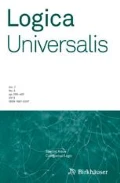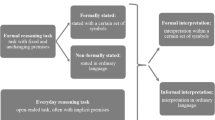Abstract
Reasoning is a goal-oriented activity. The logical steps are at best the median part of a full reasoning: before them, a language has to be defined, and a model of the goal in this language has to be developed; after them, their result has to be checked in the real world with respect to the goal. Both the prior and the subsequent steps can be conducted rationally; none of them has a logical counterpart. Furthermore, Logic aims at prescribing what a correct reasoning is. But correct with respect to what? If the answer is: with respect to truth, the next question is whether the truth in everyday life, physics, economy, is the same as the truth that logicians have in mind. Resorting to Logic is justified only if an idealization in terms of true propositions in the logical sense is compatible with the goal. If such an idealization is legitimate, so is the use of classical Logic. If not, there is no authority forbidding to skew Logic in order to better reflect the nature of the reasoning required for the task.
Similar content being viewed by others
References
Gigerenzer G., Todd P.: the ABC Research Group: Simple Heuristics that Make us Smart. Oxford University Press, New York (1999)
Kayser D.: Abstraction and natural language semantics. Philos. Trans. 358(1435), 1261–1268 (2003)
Horn, L.R.: A Natural History of Negation. University of Chicago Press (1989)
Fahlman, S.E.: NETL—A System for Representing and Using Real-World Knowledge. The MIT Press (1979)
Cook, S.A.: The complexity of theorem proving procedures. In: Proceedings of STOC, pp. 151–158 (1971)
Israel, D.J.: What’s wrong with non-monotonic logic? In: Proceedings of the 1st AAAI Conference, pp. 99–101. Stanford University, August 1980
Reiter R.: A logic for default reasoning. Artif. Intell. J. 13(1–2), 81–132 (1980)
Moore R.C.: Semantical considerations on non-monotonic logic. Artif. Intell. J. 25(1), 75–94 (1985)
Denecker M., Marek V.W., Truszczynski M.: Uniform semantic treatment of default and autoepistemic logics. Artif. Intell. J. 143(1), 79–122 (2003)
Marek W., Truszczynski M.: Nonmonotonic Logic Context Dependent Reasoning. Springer-Verlag, Berlin (1993)
Brewka G.: Cumulative Default Logic: in defense of nonmonotonic inference rules. Artif. Intell. J. 50(2), 183–205 (1991)
McCarthy J.: Circumscription: a form of non-monotonic reasoning. Artif. Intell. J. 13(1–2), 27–39 (1980)
McCarthy J.: Applications of circumscription to formalizing commonsense knowledge. Artif. Intell. J. 28(1), 89–116 (1986)
Lifshitz, V.: Circumscription. In: Handbook of Logic in AI and Logic Programming, vol. 3. Oxford University Press, Oxford (1994). http://www.cs.utexas.edu/~vl/mypapers/circumscription.ps
Engel, P.: La norme du vrai; Philosophie de la Logique. Gallimard (Paris) (1989)
Dubois D., Prade H.: Possibility Theory: An Approach to Computerized Processing of Uncertainty. Plenum Press, New York (1988)
Pitrat, J.: Métaconnaissance, futur de l’Intelligence Artificielle. Hermès (Paris) (1990)
Author information
Authors and Affiliations
Corresponding author
Rights and permissions
About this article
Cite this article
Kayser, D. The Place of Logic in Reasoning. Log. Univers. 4, 225–239 (2010). https://doi.org/10.1007/s11787-010-0017-y
Received:
Accepted:
Published:
Issue Date:
DOI: https://doi.org/10.1007/s11787-010-0017-y




